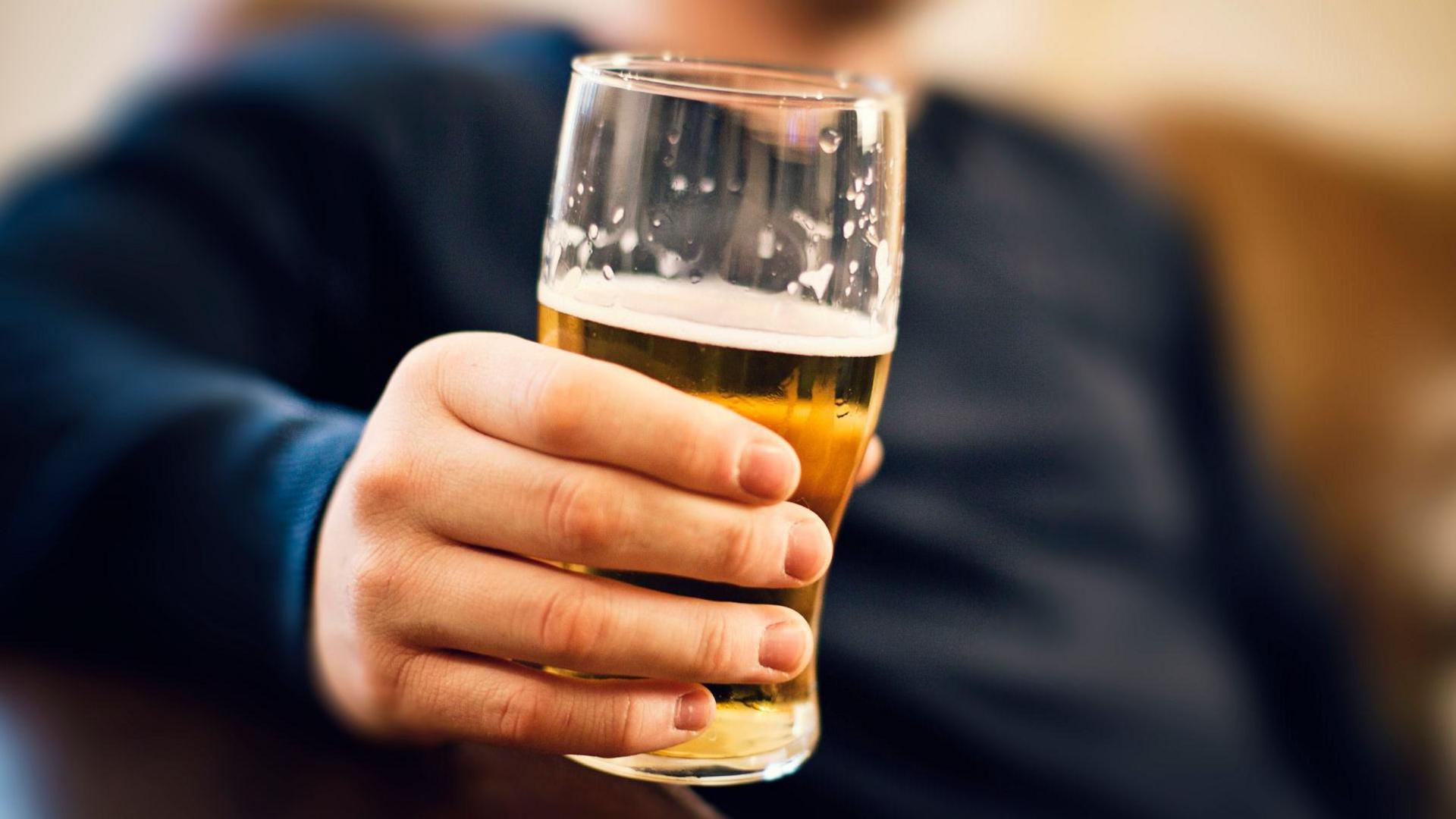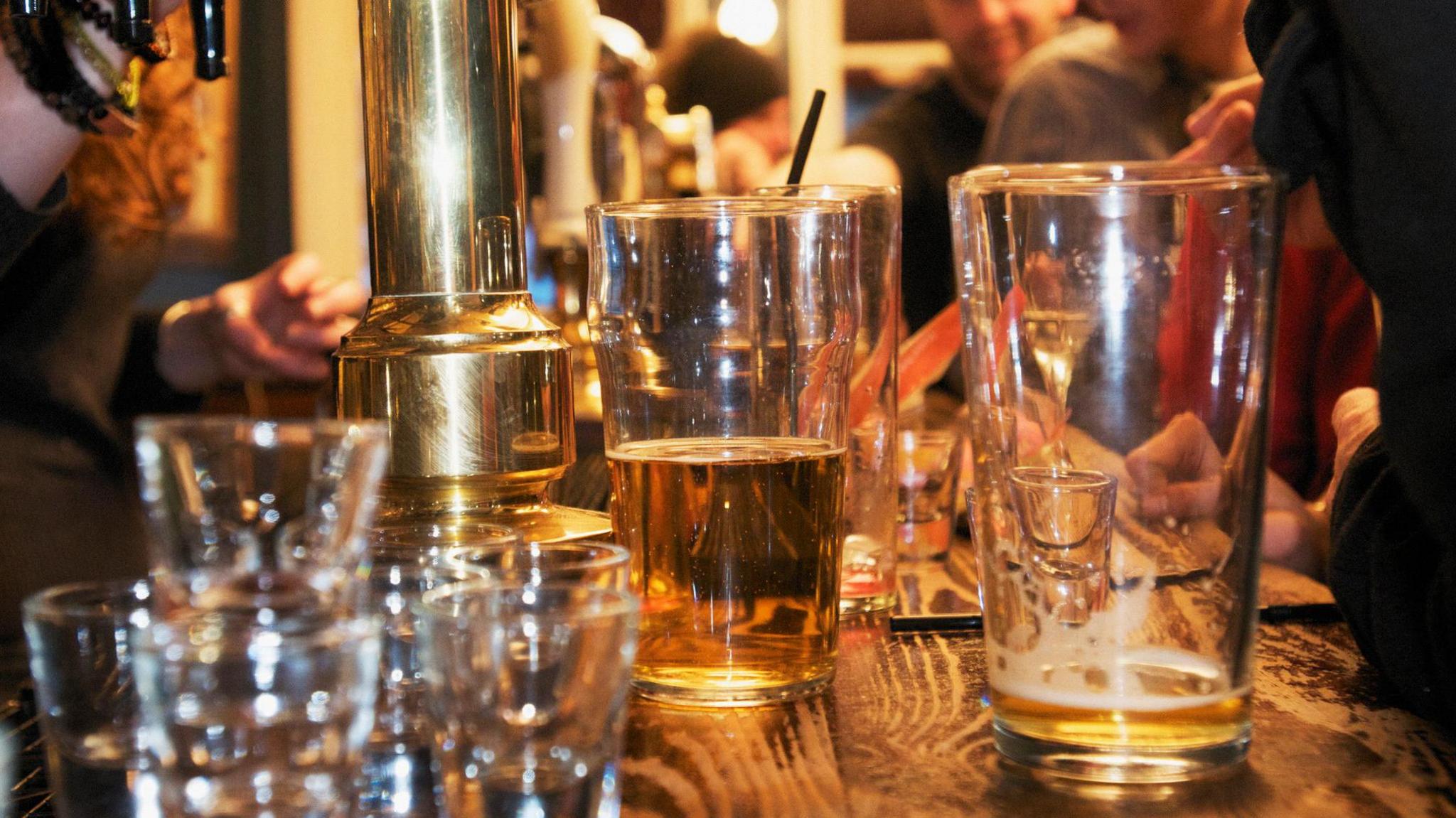Scottish alcohol deaths at 15-year high

- Published
The number of people in Scotland whose death was caused by alcohol remains at a high level, with the largest number of deaths in 15 years.
The latest figures from National Records of Scotland, (NRS) show 1,277 people died from conditions caused by alcohol in 2023.
This was one death more than the previous year, which was the highest number since 2008.
Public Health Minister Jenni Minto said the Scottish government continued to treat alcohol-related harm as a public health emergency.
Male deaths increased to 861 and again accounted for about two thirds of alcohol-specific deaths. Female deaths decreased by 24 deaths to 416.
Those aged 45-64 and 65-74 continue to have the highest mortality rates.
Alcohol-related issues were listed as the cause of death for 140 people between the ages of 60-64, while 128 people between 65-69 died.
Alcohol deaths rise to highest level in 14 years
- Published29 August 2023
Minimum pricing averts alcohol deaths, study claims
- Published21 March 2023
What is minimum pricing for alcohol and how does it work?
- Published8 February 2024
The youngest age group to record any deaths related to alcohol was 20-24 - this age group had two deaths in 2023.
Areas such as Inverclyde, Glasgow City, North Lanarkshire, and Dundee City saw deaths above the Scottish average.
Glasgow City continues to have the highest mortality rate by some margin recording 184, although this was down from 202 on the previous year. North Lanarkshire saw 115 deaths, up from 107.
Phillipa Haxton, head of vital events statistics, said the rates of deaths had "generally risen" since 2012.
She said: "If we look at the average age at death, that has risen over time.
"The mortality rates for those aged 65 to 74, and 75 and over, were at their highest since we began recording these figures in 1994.
"At the same time, for age 25-44 the mortality rate has been fairly stable over the last decade.”
Public Health Minister Jenni Minto said: “My sympathy goes out to all those who have lost a loved one through alcohol. The Scottish government is determined to do all it can to reduce alcohol-related harm and we continue to treat it as an equal priority with drugs as a public health emergency."
She said that as well as increasing the minimum unit price for alcohol, the Scottish government had invested in alcohol treatment services and was exploring ways to reducing children and young people’s exposure to alcohol marketing.
'National scandal'
Scottish Conservative health spokesman Sandesh Gulhane said alcohol-related deaths remained “disgracefully high”.
He said: “The level of deaths is utterly horrifying and shameful for an SNP government who insist they are progressive; it is our most deprived communities that continue to be hit the hardest by their failings.
“SNP ministers who have been wedded to their flagship minimum unit pricing policy to tackle this crisis must finally accept that it has monumentally failed."
Scottish Labour's public health spokeswoman Carol Mochan said "the scale of this crisis is a national scandal".
“The number of deaths being directly caused by alcohol is just one part of the damage alcohol does in Scotland, with many more lives being ruined," she said.
She added: “There is no excuse for inaction when lives are on the line – the SNP government must set out a comprehensive plan to tackle the root causes of this public health emergency and ensure drug and alcohol services can offer people the lifesaving support they need.”
Scottish Liberal Democrat leader and health spokesperson Alex Cole-Hamilton added: “It is devastating that more than 20 people a week die due to alcohol misuse in Scotland. This will be a hard day for all those who have lost a loved one.
“We need joined up thinking from the Scottish government to stop alcohol wrecking lives and communities.”

The minimum price for alcohol will rise later this month
Dr Peter Rice, chairman of Scottish Health Action on Alcohol Problems said the deaths could have been prevented.
“Scotland's approach to reducing alcohol harm has had success in reducing alcohol deaths in the past, including with the introduction of Minimum Unit Price in 2018," he said. "However, to be successful policy needs to be sustained and progressive."
Laura Mahon, deputy chief executive of Alcohol Focus Scotland, said the figures continued to be "alarmingly and unacceptably high".
"They have been driven by heavy drinking patterns established during the pandemic which unfortunately show no real sign of improving," she said.
"We need a radical step change if we are to turn this terrible tide of alcohol harm, which claims the lives of friends and family and impacts every one of us."
Scotland continued to have the highest alcohol-specific death rate of the UK in 2022. UK wide-figures are not yet available for 2023.
The difference between Scotland and the other UK countries has narrowed over the past two decades.
In 2001, the alcohol-specific mortality rate for Scotland was between 2.1 and 2.9 times as high as other UK countries.
The rate for Scotland was between 1.2 and 1.6 times as high in 2022.
Upward trend
There has been an upward trend in the number of alcohol deaths in Scotland since 2012, when fewer than 1,000 deaths were recorded.
Scotland became the first country in the world to introduce minimum unit pricing (MUP) for alcohol in May 2018.
From the end of this month the minimum price per unit of alcohol in Scotland will rise from 50p to 65p- a move designed to reflect rises in inflation.
The change will see the minimum price for a bottle of vodka rise from £13.13 to £17.06 and a standard can of lager will go up from at least £1 to £1.30.
A Scottish government-funded study published in March last year suggested the scheme's introduction in Scotland had led to fewer alcohol-related deaths and hospital admissions compared to England.